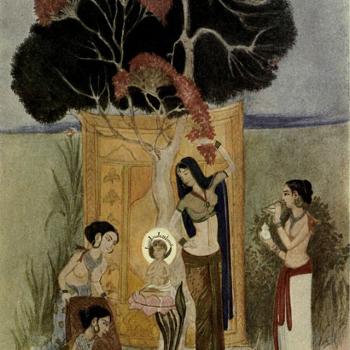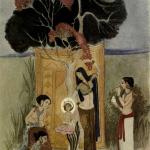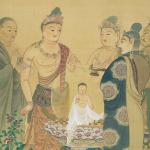I want to talk about wonder. This isn’t going to start like I’m talking about wonder, but I swear that’s where this is going.
First, a little context: I am an evolutionary ecologist, and I am also an animist. As an evolutionary ecologist, I study how organisms interact with their environments, and I’m particularly interested in how organisms and environments shape each other through their interactions. As an animist, I believe that all things have life, that every thing is animate, and that the divine, the numinous, whatever name you know that presence by, is us and surrounds us, as it is a function of the whole of life being greater than the sum of its parts.
A lot of people are surprised to hear that I am both of these things. They seem to expect that since I am a scientist, I should be “entirely rational” and have no conception or experience of the divine. Or that, as a person with a deeply felt, and very embodied, earthly spirituality, I must find the rationalistic strictures of research difficult. Some people from both sides of this divide even question whether I can really be “a good scientist” and maintain any form of belief at all.
People tend to assume that I must have to do some sort of complex mental gymnastics to reconcile these apparently incompatible ways of being with each other. The thing is, I’ve always found this perspective a bit strange because for me, not only is there no conflict, but ecology and animism imply each other. I am an ecologist because I am an animist, and I am an animist because I am an ecologist. How can one step into the forest and not perceive the divine in the complex interplays between members of an ecosystem? On perceiving it, how can one not want to get to know them better?
My point here is that the conflict between the scientific perspective and the spiritual perspective is a construction, and it is one that is institutionally reified on both sides of the apparent argument (that is, this conflict is ‘made real’ by scientific institutions and by churches) for the sake of protecting their respective positions of power.
The arguments are framed through an emotional lens that then becomes internalized by nearly all of us, and has a profound impact on how we perceive our world, breaking the complex nuances of reality and human perception of reality into two simplistic and proscribed, and most importantly, polarized categories, roughly, logic, empiricism, and rationalism, on one side vs. intuition, emotion, and faith on the other.
We’ll get into this more in a minute, but essentially through a strict empirical-logical view, everything is ultimately comprehensible. Everything is open to being studied and theoretically understood. Through a strict intuition-faith view, nothing is. The vast complexity of existence is too broad to even begin to comprehend. The truth, of course, lies somewhere in between, as does something else.
So the trouble here isn’t actually empirical thinking, and it’s not intuitive thinking. The trouble is letting someone sell you on the idea that you are actually physically capable of taking one and leaving the other, when both of these modes of perception, of looking at the world, are absolutely critical to our ability to understand and relate to reality. Organized science and organized religion would have us attempt to do one in favor of the other, as if you can be entirely rational or entirely emotional. Trying to do this deprives us of a holistic and complex model of reality, as well as forcing us to deeply alienate parts of ourselves and our experiences by trying to identify with only one part of the human experience.
If you try to experience reality through what we’ll call a strictly scientific lens, all things are subject to examination and comprehension. So, science used to do this thing that I refer to as pinning butterflies. We still do it to an extent (research is just beginning to emerge from its butterfly-pinning days of understanding reality, into the time of understanding that everything, really everything, is ecology (it’s not like I’m not biased or anything :p )).
So. I think we all know what a butterfly is. A butterfly is a sort of insect with big, beautiful wings, and huge compound eyes. It undergoes this incredible transformation from a super squishy adorable little guy to something that basically looks like a floating jewel. Butterflies have been ridiculously elegant vastly longer than we’ve been around to observe them, and whatever we think we understand, butterflies know what they’re about.
Butterfly pinning is where you capture an organism or a phenomenon, in this case a butterfly, and since the full complexity of life is impossible to articulate you pin the butterfly and dissect it and say that if you can diagram the structure of its heart and the anatomy of its wings, that you understand the butterfly. Obviously you do not. Now, logically if we continue this process we understand all the pieces of the butterfly and how they fit together. We have insight into the butterfly, and this is incredibly valuable, but we still do not “understand” the butterfly.
In order to truly understand the butterfly we would have to understand where it lives, how it lives, the circumstances that brought the butterfly into existence, fully make sense of all the butterfly’s behaviors, and, at that point, we would still be missing the absolutely crucial step of perceiving and interacting with the world as a butterfly. The good news is that statistically, in the long run, you are very likely to become a butterfly. Or at least, parts of you will because the matter and energy that comprise you will eventually make up bits and pieces of all kinds of other things. The bad news is that perfect information, perfect knowing, is impossible, and even if it were you simply cannot know the butterfly from the inside and the outside at the same time. You cannot fully comprehend the butterfly.
The bad news is, you cannot ever perfectly comprehend all of the circumstances that came together even just to create that specific butterfly. As Carl Sagan observes, “If you wish to make an apple pie from scratch, you must first invent the universe.” Basically, in order to fully, actually, completely understand the butterfly we would have to be able to be god. We cannot invent the universe. We cannot even get our conception of the universe past the point of the big bang to answer very obvious, and very hard, questions like: where did all that matter and energy come from in the first place?
So. Looking at reality from this angle, some kinds of questions are allowed and other kinds, the kinds we can’t create an experiment to test, are not. The only things that matter are things that can be broken down into their component parts and explained mechanistically. Everything that is incomprehensible or strange or too complex is neatly swept under the rug after being carefully labeled: not worth knowing. All mystery is eliminated, not in that it is solved, but that the light of what we can know and measure is so bright that it washes out the beauty of the complexity, and blinds you to the very obvious, very dark, shadows that remain. When we take this as our only mode of perception, we conflate having information with knowing what to do with it, and thus we mistake knowledge for wisdom.
If, however, we try to experience the butterfly through a strictly emotional or religious lens, the butterfly becomes unknowable, its movements mysterious. The butterfly becomes a vehicle for meaning, the profound loveliness of its wings, the grace of its flight each taking on their own significances, but our view of the creature itself risks becoming untethered from the fact that this is a living organism with its own experience. From this angle too, some questions are addressable and others are not. Preservation of the mystery becomes so holy that it is not even to be looked upon. Any attempt to learn, to understand, is met with fear of piercing the veil, of glimpsing the mechanisms of creation. Or it is dismissed as being ultimately unimportant, because what is the use of attempting to comprehend anything if we cannot become ourselves like god? But is a mystery that cannot stand to be examined really that mysterious? Conversely, do you think there any real risks of actually “solving reality?” I refer you again to the apple pie.
Without any attempt to comprehend, there can be no attempt to relate. We turn our faces from the light of what we can know and what might be worth knowing, and all is drenched in darkness. When we take this as our only mode of perception, we mistake understanding that the profound is all around us as the whole of wisdom, and we remain in the dark.
So if the trouble isn’t empirical-logical thinking, or intuitive-emotional thinking, but believing there is some sort of battle between them, how do we reconcile these notions to make peace in a world that insists on conflict?
We do it by periodically reminding ourselves to stop mistaking reality itself for the boxes we fit it into.
Reality is complicated. Even the fraction of it most of us deal with on a regular basis is infinitely complicated. So much so that we cannot physically take in all of the information we are receiving at any given time, let alone do that and think. So we generalize. Science and religion/spirituality are both ways of making sense of our experiences of Reality. Both are limited in perspective because they are both models. We need these models to be able to reduce complexity to the point we can deal with it, and we need multiple models because none of them are perfect. We need to be able to see the butterfly both ways because we need to be able to perceive meaning and do problem solving.
One of my favorite examples of this is species concepts. In biology, there are several ways to define what a species is. The most commonly used one, the biological species concept, identifies two creatures as members of the same species when they can interbreed and produce fertile offspring. The ecological species concept identifies two creatures as members of the same species when they have the same ecological niche, essentially, the same function. When I’m teaching, a common question from my students is which species concept is “the correct one,” and I have to inform them, much to their distress, that we have several definitions because no definition works in all cases.
Take dogs. If we use the biological species concept, all nine species in the genus Canis: dogs, wolves, coyotes, jackals, all become one species. They’re clearly not, so we have to use the ecological species concept to instead describe the bounds of each species by its way of being, its niche. The difficulty arises because to Nature itself, there are no species. There are groups of organisms that relate to each other in patterned ways. The species concepts are called species concepts because that is exactly what they are– concepts. They are boxes we put around an aspect of nature to simplify and understand it, but because they are constructs, one box doesn’t fit all situations. If we didn’t try to define species, we wouldn’t recognize the red wolf (Canis rufus) as endangered and try to protect it because dogs (canis familiaris) and coyotes are incredibly common, and we would have already lost this beautiful and unique creature.
What, then, lives in between the areas our understanding can reach and the areas we cannot create testable experiments to bring into the light of the Known, the thing we deprive ourselves of when we try to force our reality into one prescriptive box without recognizing that these boxes are imperfect? Oddly enough, the thing both sides of this debate so often accuse the other of killing:
Wonder.
Wonder is the generating impulse for both science and religion and the thing that ultimately they are both reaching towards. True wonder, true magic, in my opinion, lies in the interstices. By not approaching reality as fully comprehensible or fully mysterious, but as something in between, knowable perhaps, as another person is knowable: in parts but never in total. Wonder, by its nature, cannot be boxed, cannot be distilled, it is what happens when the limits of your perception exceed the limits of your comprehension. It’s about trying to understand but not allowing your current understanding to limit what you can experience.
And wonder is accessible to you at all times, in all places. It’s in this church, right now. It’s in your hands, it’s in the floor, it’s in your neighbor, it’s in the plants in the courtyard. Take a moment to feel it.
If you’re having trouble, may I suggest our friend the butterfly? Consider the fact that some of the stuff that makes us in this room will, very likely, barring climate change, someday constitute butterflies? Close your eyes. Imagine it. Imagine what will need to happen for your body, your energy, to someday become the stuff of a butterfly. Imagine being the butterfly. Imagine being a caterpillar, then going into a chrysalis where you turn entirely to goo in order to transform yourself, and emerge as a creature with delicate, expansive wings, and memories of inching along the ground on six stumpy legs, with matter that used to be human. Do you experience a linear progression of facts, of transfer of matter, something else? Do you think about times you have transformed? What do you linger on? What in these great strange magic tricks of time, stand out as wondrous to you?
We could diagram it. Does that make it less extraordinary? Knowledge does not kill wonder, as I have heard people say, because there is never an end to what we can reach to understand. It is the wonder of the world that draws us to study it, and every question reveals ever more deeply unfolding mystery. Science and belief are not incompatible because one operates in the realm of the testable, and the other operates in the realm of the felt. When we hold our wonder consciously, at the intersection of reason and belief, it’s easy to fall in love with the complexity, to appreciate both what we can know, and what we must take on faith.
Instead of trying to view reality as “ultimately comprehensible” or “ultimately mysterious”,
How about, each being and creature and bit of matter and photon gets to have its own totally unique experience, and that, if we were to put the sum of experience in a blender, we would get both the matter of the universe and perhaps, the ultimate comprehension? As limited creatures, as human-shaped and human-sensed creatures, we get to have the experience, comprehension that a creature with a human shape and human senses gets to have. The entirety of reality cannot possibly be comprehensible to us because (while we have and will take infinite forms in time) we cannot have infinite forms and retain consciousness to appreciate them. But we can have a fully embodied human perspective, and that includes our desire to make sense of reality around us. We can’t boil the universe down to ultimately comprehensible or ultimately mysterious because it is both, and neither, and that is ultimately wondrous.













